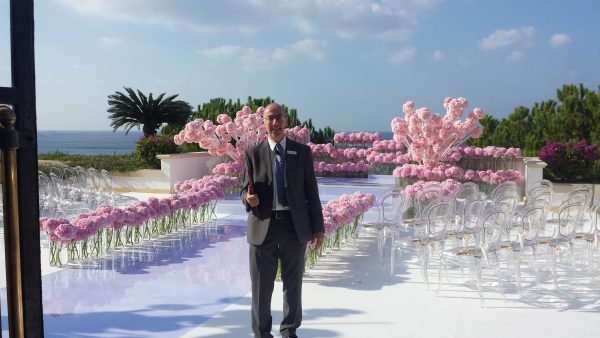
by Michael | Dec 28, 2017 | Blog
As another year comes to an end, it‘s only natural to look back. What has been especially memorable? What has stood out?
Every ceremony is different, of course, so it’s impossible to compare like with like. However, I did my first destination wedding in September, so perhaps it is inevitable that I mention that.
Destination Wedding
A lot of work went on in this country beforehand – starting with my rigorous interview (or, actually, interviews). Once the groom had met and approved me, it was the turn of the bride. During that meeting, a recording of me reading was made, and sent off to her parents. Eventually, I received the green light.
This was a five-star wedding in Cyprus. The groom was a South African-born Jew, and the bride Russian Orthodox. In fact, religious content turned out to be minimal, but I needed to be able to address the Russians in an acceptable accent (hence the recording at interview).
The venue (Hotel Anassa), about 1.5 hours from Paphos was a stunning location, and no expense was spared. For reasons of confidentiality, the only photo I can show was of me (flowers – and the wonderful ocean backdrop) before we started (see picture above).
Handfastings
Other ceremonies were less glamorous, perhaps, but nonetheless enjoyable. I particularly think of two, both handfastings.
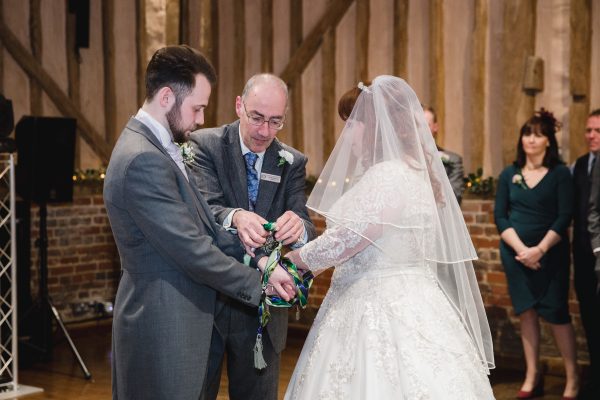
Source: louiedonovanphotography.co.uk
The first was at Lillibrook Manor, which has a fabulous half-timbered barn and, indeed, wonderful atmosphere. A room was even set aside for me to prepare in, which is most unusual in my experience. The couple were so kind, considerate and warmth glowed from them that it was impossible not to be carried away with the whole ceremony. (I had to make sure I kept my mind on what I was doing!)
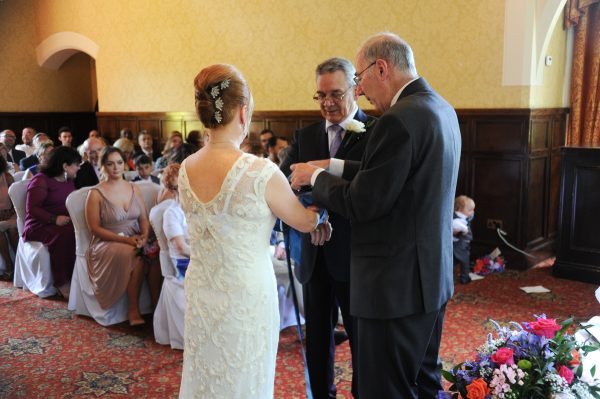
The other handfasting was at the Grim’s Dyke, which is a fabulous setting. The weather was glorious, so the ingredients were perfect. The couple, who were both on their second marriage, were initially nervous, but relaxed totally by the end, and their happiness was infectious.
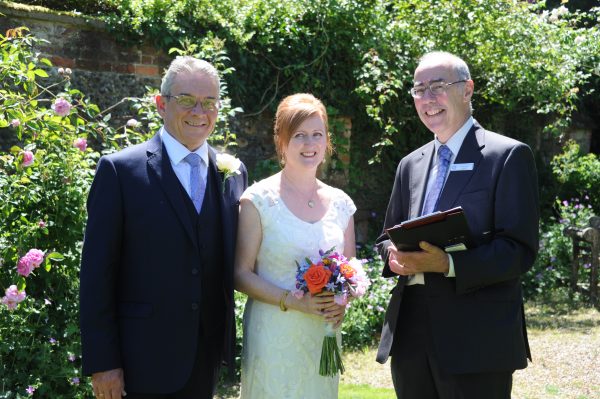
Funerals
People often ask me why I love funerals. Of course, I am sorry that people have died, and their survivors are grieving. The great thing is that I can offer a lot of help and support during the short period that I know them, and that is so satisfying.
Just one example of what I can offer comes in this testimonial:
Dear Michael,
We just wanted to say thank you for all your help and support in the last couple of weeks and during the service for Bill/Dad yesterday. Everyone we talked to said it was a lovely service.
Thank you again,
Margaret, Colin & Graham W.
So it has been a successful and enjoyable year. I have seen my business grow (though not dramatically – I still have availability for 2018!), and I am looking forward with optimism to the New Year.
May I thank you for your support and interest, and wish you all the very best for a healthy, happy and successful 2018.

by Michael | Sep 12, 2017 | Blog
Destination weddings sound fairy-tale, and tend to be fabulous. Most of us can only dream of one. They are mostly for the very rich only.
Actually, the “average” ceremony may have the same elements as a foreign one, but will probably be less ambitious and cost a lot less.
However, one thing that unites a more modest and a destination wedding is the ceremony. Whether religious, part-religious or secular, somebody will have to be hired to officiate.
I was lucky enough to be the civil celebrant at a Cyprus wedding a couple of weeks ago.
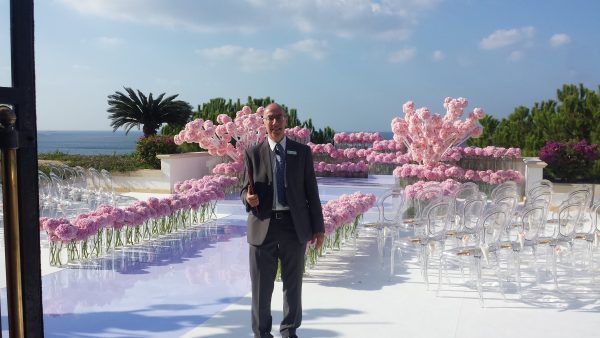
So how was that wedding different from the ones I usually tend to be associated with?
Same old, same old …?
In terms of preparing the ceremony, I worked with the couple as I normally would. We had a preliminary meeting, and I found out what sort of ceremony they were looking for and we exchanged ideas. Some of these would gradually be refined, but now we had the skeleton to start the process off.
Over the months, we exchanged some calls and texts, but the main business was an exchange of e-mails making amendments to the initial draft. We settled on a final text (well, almost “final”!) in good time.
Partly because of rehearsal time, we kept in more frequent touch in the last month.
On the day, I arrived an hour before the start time. I made contact with the relevant people (eg event planner, groom, etc.), a microphone was strapped on to me. Otherwise, it was just waiting around until the “off”. One unusual requirement was for me to read some Russian. Otherwise, the actual ceremony, though beautiful, was not really out of the ordinary.
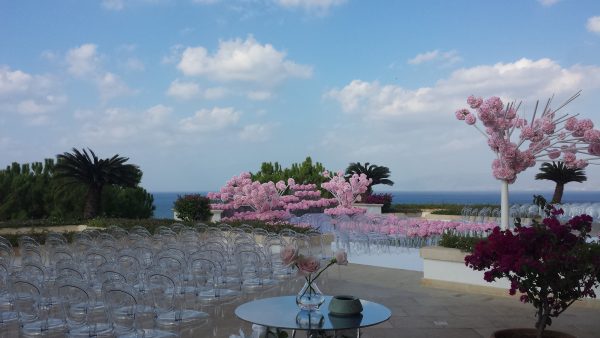
(No photos of the ceremony because I had to sign a confidentiality agreement!)
Differences
The ceremony stood out, however, because of the setting and the astonishing floral decoration. Moreover, the entire 5-star hotel had been taken over by the wedding party, so eating, drinking, the ceremony and canapés, and the entertainment all took place in different parts of the beautiful hotel.

Hotel Anassa
Obviously, the fact that I was flown out, fed and accommodated for a couple of days was different from conducting a wedding in Harrow. (I didn’t stay at the 5-star hotel, tragically – though I was given a studio in a 3-star hotel, which, I confess, was more than acceptable!)
So why a “destination wedding”?
Is it worth paying a vast amount, when a destination wedding (in most cases) gets you the same basic elements as many an “ordinary” wedding will offer? You end up with a similar ceremony, maybe canapés, a meal and drinks, flowers, caterers, entertainers, etc.
However, the extra cash should provide peace of mind (with a professional wedding planner to do the big tasks and also look after hiccups) and quality – whether of venue, food, supplier or whatever. And this will make a difference.
My own small experience of destination weddings has left me more than willing to head out and conduct more!
by Michael | Jul 24, 2017 | Blog
I am being asked more and more often about naming ceremonies and what they consist of, so I thought a blog answering that question might be in order.
Why a Naming ceremony?
A few common reasons for arranging a civil ceremony are:
- Religious elements are wanted, but the couple are mixed-faith
- The couple want to mark the rite of passage, but preferably not (or barely) religiously
- A couple are marrying, and bringing a child or children into the relationship. They want to formally symbolise their integration into one family.
What does a Naming ceremony consist of?
Because I specialise in bespoke ceremonies, I can’t give a one-size-suits-all answer. As we have already seen, these ceremonies may be religious or secular, and can be held indoors or out. Thus rituals will be more or less appropriate depending on the circumstances and tone.
Participation
Naming ceremonies tend to be more relaxed (although some of the content may be quite serious), and there’s usually a greater element of participation than with many other ceremonies.
Here, the parents may want to take an active role. They may choose and read poems (of course, the celebrant can help them with choices). They may also read out promises to the child. Again, they write these themselves or use a bit of help.
Godparents and/or grandparents may be invited to play a role. They may read a text about what it means to be a god/grandparent, for example.
Ritual
As well as music, which is another option to be considered, you could include some rituals. Unity candle lighting is deservedly popular. This doesn’t always work outdoors (for obvious reasons!), and health and safety does have to be taken into account inside! But it’s especially good if two families (with children) are combining.
Another possibility for a baby, is to sprinkle her with rose petals (different colours representing desired qualities). Again, this invites participation.
The ceremony might end with a communal blessing and a baby-specific blessing (not necessarily religious).
I hope this gives a flavour of the “typical” ceremony, and will whet a few appetites! I’ll be very happy to help out, if you want to know more.
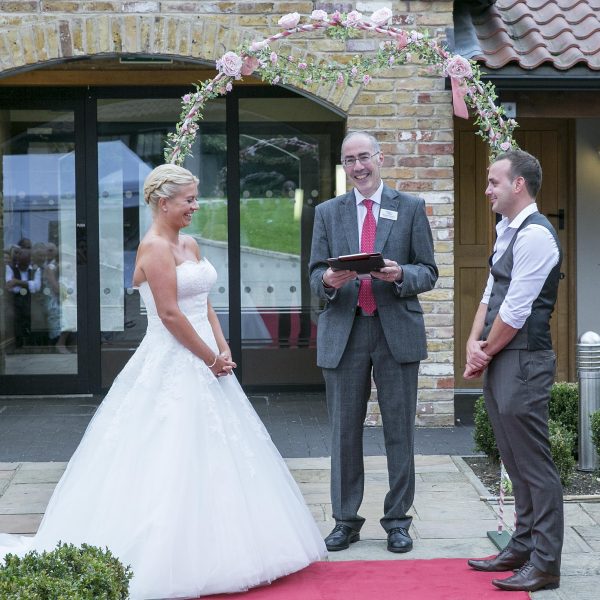
by Michael | Jun 20, 2017 | Blog
Your wedding ceremony should be the most important day of your life. Of course, you want to get it right. But what does it mean, to “get it right”?
There’s a lot of choices out there – possibly, more than you realise.
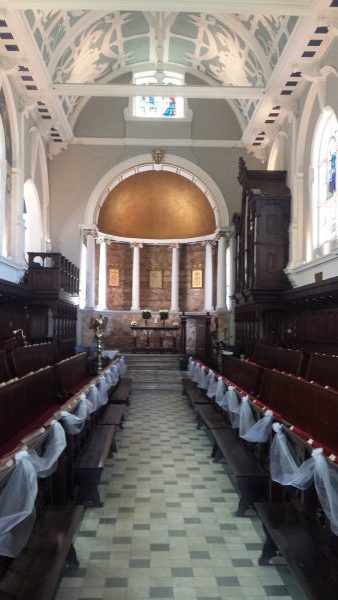
Religious, or not?
In many cases, the first decision you make together is whether or not you want a full religious ceremony. If not, do you want the other extreme? Of course, you can have a fully secular one, but maybe you prefer a mixture?
Anglican
If your choice is a Church of England ceremony, it’s easier if it’s your local church, but you can choose another one. Normally, the Vicar will be able to take you through everything. There’s no need to visit a Register Office either, as everything can be done in one ceremony. The cost of this starts at £456.
Church of Scotland
Church of Scotland ceremonies can take place anywhere and at any time (as long as your minister is in agreement). You don’t need to be a Scottish resident – but you do need to give between 15 days and three months’ notice at the Register Office.
Roman Catholic
You’ll need to take your baptism and confirmation certificates along to your priest at least six months before you wish to marry. If one of you hasn’t been baptised, your priest’s permission will be needed. You’ll be expected to attend marriage preparation classes, and to attend Mass for six weeks before your wedding day. Additionally, you need to go to your local Register Office to give notice and obtain your marriage licence.
Jewish
You will need to apply to the religious authorities and to the local Register Office. A religious ceremony will normally take place in a synagogue, but the rabbi may agree to conduct it elsewhere.
Secular
If you’re certain you want no religion, then you can opt for a humanist wedding. This will not be recognised in law, so you will still need to attend a Register Office ceremony beforehand. You can hold the humanist wedding wherever you wish, and can write your own vows and hire a humanist celebrant.
Just remember, that in a humanist ceremony, there should be no mention at all of God or even religious references, so if that’s a bit too extreme, you may want to consider a civil ceremony.
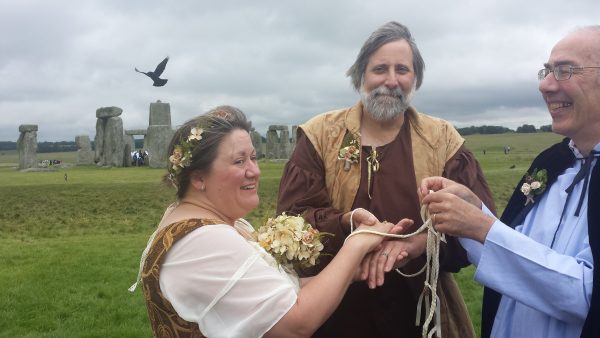 Civil Ceremony
Civil Ceremony
Like the humanist wedding, a civil wedding has no legal validity. It is simply a ceremony that is put together specially, usually by a professional civil celebrant. It should create a fabulous atmosphere and may well reflect the personalities and beliefs of the couple.
You can hold this wherever you like. If it’s in a property licensed for marriages, the registrars can be booked to come out (at an extra charge) and conduct the legal ceremony there. The civil ceremony can follow on straight afterwards. Otherwise, if not in licensed premises, you both need to go to the Register Office beforehand, with two witnesses. (This costs £35.)
Register Office
In addition to the celebrant charge, you will have to pay the registrars for the legal words to be pronounced. To organise this in the first case, go to the local Register Office to give notice. (If you’re not marrying locally, you’ll have to contact that particular Register Office to ensure they have somebody available on your chosen day.)
You’ll need ID, proof of address and nationality, any previous marriage documents and details of your venue. Once issued, the notice will be displayed for 15 days before you can legally marry. Your marriage licence is valid for a year.
You can find your civil celebrant via recommendation, Google – or at this website!
So I hope you see that there are other routes open to you than full religious or humanist. As long as the legal words are said and witnessed properly, everything else can be as original and personalised as you choose. You really can have the day of your dreams!
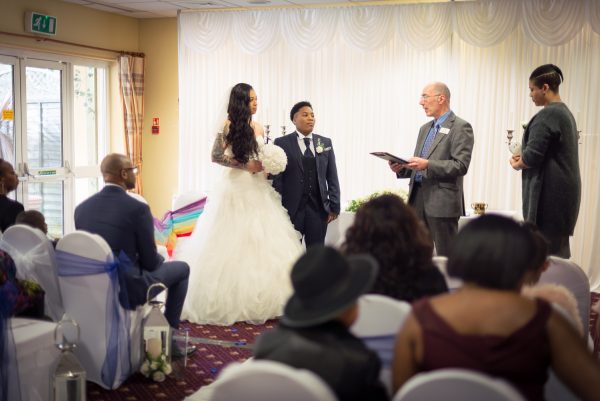
by Michael | May 8, 2017 | Blog
Having recently conducted a wonderful same-sex wedding, I started doing a bit of mulling. Presumably, there are major differences between heterosexual and same-sex ceremonies?
Dress
In this particular case, as you can see, one spouse wore a white wedding dress; her partner wore a lounge suit and tie. Obviously, formality was what the pair wanted, and that fitted the bill.

So one tick on the list of similarities straight away.
Family
Probably not so simple. What if the family opposes your marriage? Especially if it’s same-sex.
There are plenty of examples, however, of obstacles being placed in the way of heterosexual couples, so this is a similarity, rather than a difference.
Incidentally, a possible solution to this problem is to use diplomacy. You may be able to encourage the parent (or whoever) to feel more positive by inviting them to participate in some way in the ceremony, for example, by doing a reading. Or you might assure them that you will (still) visit them as regularly as before at weekends/holidays etc.
Of course, you should get them to meet and get to know your partner, preferably informally. If the charm offensive doesn’t work, then think about asking your officiant to have a word.
If you want a religious (or part-religious) ceremony (or your parent does), then you can always use a civil celebrant like myself.
So not that different, whether the wedding is same-sex or heterosexual.
Suppliers
A few venues may have problems with gay ceremonies, but decreasingly so. In the same way, some suppliers may not want to work with a same-sex couple. You may recall that an intransigent anti-gay cake-maker in America was prominent in the news a year or two back. The fact that that was a big news item highlights the rarity of such an occurrence.
Problem areas
The only area that may cause a problem in a single-sex ceremony, as opposed to a heterosexual one, lies in vocabulary. Is the couple to be referred to at the end as “Mr and Mr Jones” or “Mrs and Mrs Smith”?
It’s possible that some of the readings will need a bit of rewording, but essentially the same-sex and heterosexual ceremony should turn out to be much the same.
The celebrant can always alternate the names, so it isn’t always the same person being addressed or referred to first.
As we have seen, the differences are actually not so great between heterosexual and same-sex ceremonies. I hope that will reassure you that absolutely nobody needs to be put off from arranging a same-sex ceremony!
Don’t forget that I can help out! Just send me an e-mail or give me a call.











 Civil Ceremony
Civil Ceremony